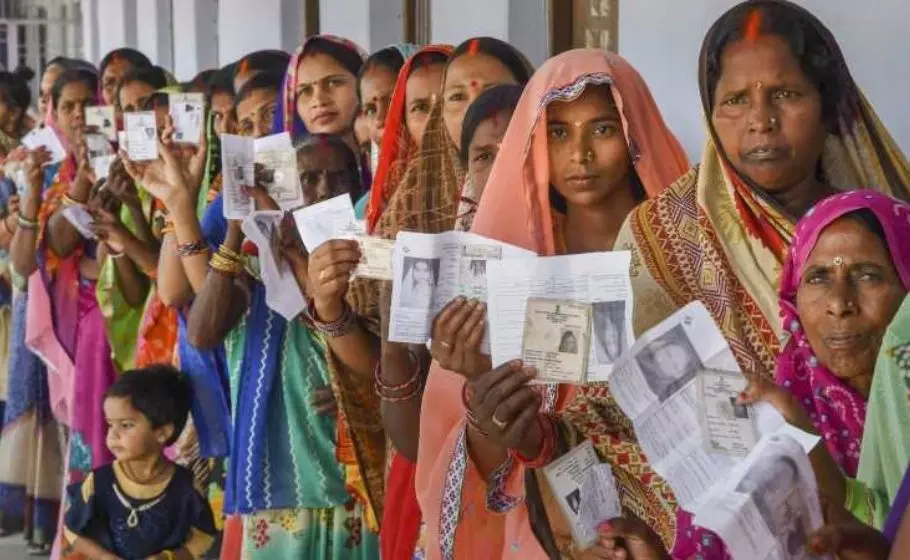
Why BJP thinks women's reservation bill will be a game changer in 2024 polls
The Centre has brought the bill keeping in view both the upcoming state assembly polls and the general elections nine months from now to harness the goodwill it will generate among women electorate

Taking the first step towards its poll campaign for the 2024 general elections, Prime Minister Narendra Modi made a commitment on Tuesday (September 19) that the ruling Bharatiya Janata Party (BJP) would get the crucial Nari Shakti Vandana Adhiniyam, or the women’s reservation bill, passed during the ongoing Special Session of Parliament.
The move is significant as, with the bill's introduction, the BJP leadership has fulfilled its 2019 electoral promise of bringing the constitutional amendment bill to Parliament to allow reservation of one-third of seats in the Lok Sabha and state assemblies for women.
Women’s Reservation Bill can be a game-changer
“September 19 is historic. I would like to inform the House that the cabinet has approved a bill for reservations for women in Parliament and state assemblies. I would like to move a constitutional amendment to bring Nari Shakti Vandana Adhiniyam. I would also urge all Members of Parliament (MPs) of Lok Sabha and Rajya Sabha to pass this bill unanimously,” the prime minister said in his first speech in the new Parliament building.
With the general elections barely nine months away, senior BJP leaders hope that the move will not only help them get the support of female voters but also play a significant role in the upcoming assembly elections in Madhya Pradesh, Chhattisgarh, Rajasthan, Telangana and Mizoram.
BJP members say the bill could prove to be a game-changer for the 2024 elections, as the party hopes to get a majority of votes of women in the national polls. According to a study by Lokniti-CSDS for the 2019 general elections, the report found that out of the 36 states and Union Territories, the percentage of women voters compared to male voters was higher in at least 24 states.
Working for women empowerment
Senior BJP leaders emphasised that the Union government under PM Modi was systematically working to empower women, and the bill was a step in that direction. BJP leaders say the flagship schemes like opening bank accounts under Jan Dhan Yojana, Pradhan Mantri Mudra Yojana, Ujjawala Yojana, and the Stand-Up India Scheme are all steps taken to empower women.
“It is unfair to say that this decision to reserve seats for women is related to elections. We must not forget that these amendments will play a historic role in shaping the country's politics in the years to come. This is not about the election, it is about the completion of a promise made to all the women of the country by PM Modi. If we look at the populist programmes of the government, all the programmes like rural housing, Mudra, water to every home, and providing cooking gas cylinders are meant for women. This is a continuous process that has been going on for the past nine years,” said Lahar Singh Siroya, senior parliamentarian of the BJP.
However, there are some voices of dissent within the BJP, as some members feel that there should have been reservations for women from other backward classes.
“I am happy that the women’s reservation bill was introduced, but it was brought without OBC reservation. If we do not give representation to OBC women, then their trust would break,” said Uma Bharti, former union minister and senior leader of the BJP on the women’s reservation bill.
RSS steps in to help BJP
Even as the BJP leadership sharpens its weapons for the electoral battle ahead, the ruling party is getting support from its ideological parent, the Rashtriya Swayamsevak Sangh (RSS), to reach out to women before the polls.
Ahead of the 100-year foundation day celebration of the RSS in 2025, the organisation has decided to use the next two years to promote women and increase women's role in public life.
To start with, the RSS has instructed all 36 of its organisations to work together for the empowerment of women and to increase their role in public life by giving them more opportunities in the affiliated organisations.
“In the next two years, we will promote the involvement of women in public life and in all spheres of life. The decision has been taken to strengthen the 50 percent of the population that did not get the opportunity that it deserves,” said a senior RSS leader.
Senior leaders of the RSS have decided to hold at least 411 conferences of women across the country. According to the plan, these conferences will be held for six months starting from August 2023 and will continue till January 2024.
“Between August and September this year, 72 conferences have been organised and more than 1.23 lakh women have participated. These conferences are being organised by women for the women who are part of the different organisations of the RSS. Women from other organisations not part of the RSS-affiliated organisations are also welcome,” the RSS leader added.
A symbolic yet historic step
Political analysts believe although the women’s reservation bill is a symbolic gesture, it will have historic implications as it has the power to redefine the politics of the country. “The implementation is going to take a lot of time, and I do not see a possibility of the implementation of women’s reservations until 2029, but this decision is historic because now most political parties will support the decision. It is only the smaller caste-based regional parties that will face difficulties in implementing one-third reservation for women. Right now, it is more of a symbolic gesture by the Centre and it is difficult to predict if it will tilt the elections in BJP’s favour,” said Ashutosh Kumar, a professor at Panjab University.

